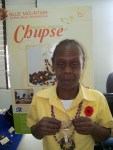The next few days were supposed to be a self-imposed break from blogging but I cannot resist my own inclination to write and report on things that deserve recognition. Such is the case with the Jamaica Association for Intellectual Disabilities. I ventured up to their office yesterday with my colleague Rhonda to learn a little more about this organization. I brought my camera, as I usually do, but no notepad or pen, reflecting my intention to take a break. But I soon found myself scrambling for paper and pen as I heard more about JAID from Development Manager Marilyn McKoy.
JAID was founded in 1955 by Randolph Lopez, a gentleman who had a daughter with Down Syndrome. Lopez’ vision eventually lead to the establishment of 27 schools offering special education, which now collaborate with the Ministry of Education. Special education is now offered in a school in every parish and there are parent support empowerment groups, services for adults, social and recreational activities and vocational training.
And then there is Chupse, which is patois for small kiss or something from the heart. Formed two years ago, this income-generating activity offers training in jewelry and craft-making for adults association with JAID. It was created with the help of a Japanese volunteer and has grown to offer dozens of beautiful products, from earrings to necklaces to key chains to bracelets. The products are sold both at JAID’s offices and schools, as well as retail locations throughout the island, including the popular Cannonball Cafe and through the Planning Institute of Jamaica.
Rashida Tennant is a trained goldsmith and was hired two years ago to provide training to participants. Chupse products are now being offered on an expanding basis across the island, and the program is financially self-sustained through profits, McKoy says.
I spoke briefly to 24-year-old Charles, who likes to work with the wires used for jewelry. He refines them so that they are not sharp and are safe for people to wear. He spoke with pride and confidence about the work he does.
Most materials are local and include fish scales, coffee beans, wood and shells. “People really and truly love the concept and all the proceeds go back into the program,” says Tennant. “Our dream is to develop a business development unit,” McKoy says, adding that the ultimate goal for participants is to create a “transitional program that prepares them for the real world.” Indeed, it is happening. “One beneficiary that started with us is now into the coffee business as a permanent employee.”
In addition to the skills they glean to make jewelry, participants learn social skills and how to work in a employment-type situation. They also generate self-esteem and learn how to assert themselves. “We are part of their lives and we love them. The concept of family is important, and this is not about tokenism, this is about a program that benefits people,” McKoy says, explaining that many programs aimed at helping vulnerable members of society focus more on appearances than actually ensuring that beneficiaries will experience meaningful and sustainable results.
The schools that now house JAID facilities were originally constructed by US Peace Corps volunteers, including the bright and airy building we visited past the UWI campus. When we were there, children were playing in the yard, happy cries echoing about. The curriculum was originally drafted by a Cuso volunteer. “Now people look at our school and say we can certainly compete with U.S. schools,” says McKoy.
Here are the criteria JAID uses to define intellectual disability:
“Intellectual Disability is characterized by significant limitations both in intellectual functioning and in adaptive behaviour as expressed in conceptual, social, and practical adaptive skills. This disability originates before age 18”
(American Association on Mental Retardation, 2002)
The following five assumptions are essential to the application of this definition:
The individual’s functioning must not be measured in environments that are isolated or segregated by ability but typical environment such as the home, church, or other environments in which people of similar age live, play, work and interact.
The individual’s culture or ethnicity, including language spoken at home, non verbal communication and customs that might influence assessment results, must be considered in making a valid assessment.
Persons have strengths as well as limitations. They have capabilities and strengths that are independent of their Intellectual Disability. This may include strengths in social or physical capabilities or strengths in one aspect of an adaptive skill in which otherwise show an overall limitation.
In analyzing one’s limitations it is important to develop a description of the supports the individual needs in order to improve functioning.
With appropriate personalized supports over a sustained period the life functioning of the person with Intellectual Disability will generally improve. Improvement in functioning should be expected from appropriate supports except in rare cases.
If you would like to learn more about JAID or find out how to view and order their products, you can call them at 876-977-1118.






